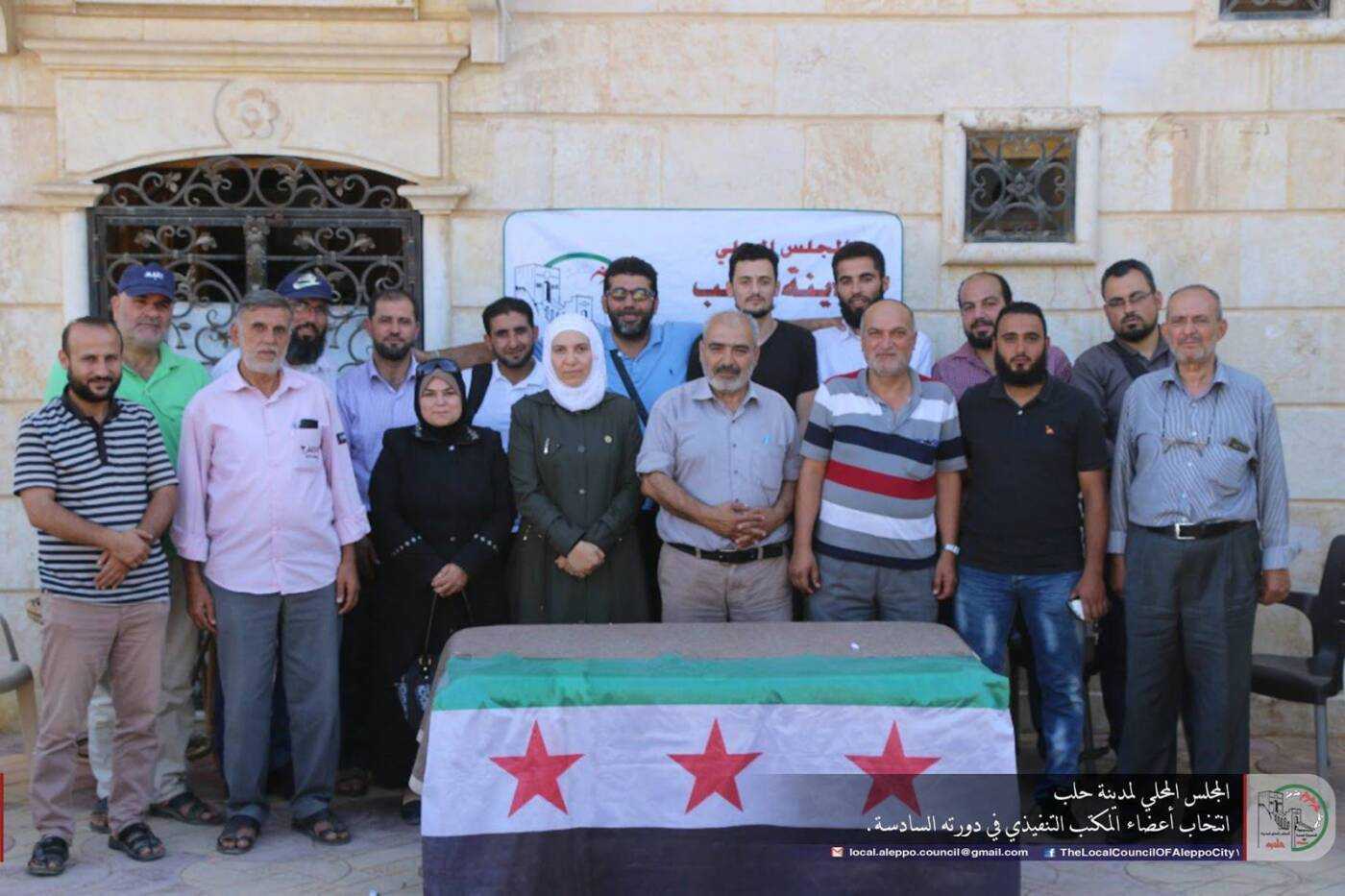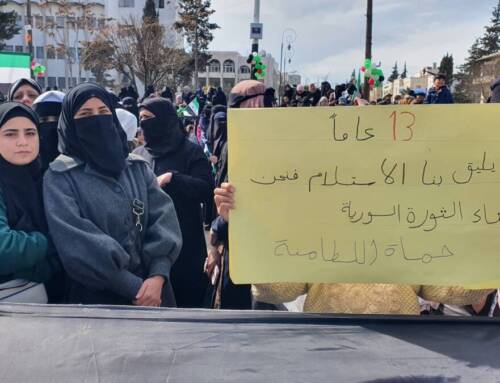In a first for opposition-run local governance, a woman leads Aleppo’s displaced city council
Members of the newly elected Aleppo City Council last week, […]
10 July 2018

In a landslide victory late last month, 38-year-old educator, activist and community organizer Iman Hashim was elected as head of the Local Council of Aleppo City, becoming the first woman to lead an opposition-run council since the Syrian conflict began.
The Aleppo city native tells Syria Direct’s Maria Ayman that since her election to the presidency, she has “encountered nothing but respect” from the community in the rebel-held western Aleppo countryside, where the local council has been operating since tens of thousands of Aleppo residents were displaced from the provincial capital in late 2016.
Providing services to Aleppo’s displaced is at the heart of Hashim’s policy platform, which she says will also target education, women’s empowerment and development—issues she tackled in previous positions as a teacher, a community organizer in the early years of the conflict, a school principal and former head of the city council’s Office of Educational and Social Affairs.
Taking on a leadership position in the city council was not always a possibility open to Hisham as a woman, she notes. In 2013, as the Islamic State expanded its influence across Aleppo province and other areas of Syria, Hashim says she was not able to join the council “out of fear for my life.”
With western Aleppo province now free of the Islamic State, the mother of four sees her past and current leadership positions as proof that women can play an increasingly prominent role in political, social and cultural spaces in Syrian society.
“The largest barrier in front of a woman is herself,” Hashim insists. If a woman believes in the work she is doing, and respects her surroundings, the “local community will not turn against her.”
Q: Can you describe your previous involvement in the Syrian uprising prior to running for election on the Local Council of Aleppo City?
I had the honor of joining the revolution during its peaceful beginnings. We worked in organizing demonstrations and taking care of demonstrators who were wounded at the hands of the violent security forces. We also welcomed displaced people from different regions—from Homs, the Aleppo countryside and the Idlib countryside—by providing them with housing and other support.
Of course at the beginning, we worked in the medical field, in the first emergency unit, which was called Quneitra Hospital, set up in the Quneitra School building. We stayed there until the building was bombarded and [the hospital] was destroyed. Afterwards, I chose to return to my primary work in education.
City council president Iman Hashim visits a school in the western Aleppo countryside on Sunday. Photo courtesy of The Local Council of Aleppo City.
After the situation in our area stabilized a little, we opened schools and nurseries. We started campaigns to send children back to school. We made significant strides through capacity-building with teachers, and opened a teacher training institute in Aleppo’s Old City. I had a prominent role in opening the school, and also supervised a number of centers dedicated to improving women’s capacities in various regions.
All of this was before the displacement from Aleppo. I assumed responsibility for the Aleppo City Council’s Office of Educational and Social Affairs for the council’s fourth session in 2015/2016, and I had the honor of representing my city on a diplomatic mission to France for the sister-city agreement between [the French city of] Metz and Aleppo in Syria.
After our displacement from Aleppo, I left for the western countryside and opened a school for displaced children in a region made up of more than 90 percent displaced people. The school’s staff also included displaced teachers.
Q: How did you decide to run for the council, and had you run previously?
The idea of standing for election came naturally, and no one tried to stop me.
I ran previously in 2013/2014, but at the time Daesh [IS] was still embedded with the other armed factions within Aleppo city—and my bid for the council was withdrawn, [out of] fear for my life.
After Daesh was expelled from the liberated areas of Aleppo, the situation returned to normal—and the council became like any other place where a woman can work and contribute. I was elected to the council [as a member] first, and then to the executive committee, before becoming head of the council itself.
There are many Syrian women in general, and Aleppan women in particular, who have proved their worth in all kinds of work.
Q: How did other members of the council, and your community, react to your victory?
The reaction from all of my friends on the council as well as outside it was generally very positive—I received encouragement and congratulations. Everyone offered support however they could.
Until now, I really have encountered nothing but respect from the local community. Even at checkpoints, I receive respect—firstly because I am a woman, and secondly because of the position that I hold.
My election to the head of the council has been welcomed by all, thank God.
Q: What policies and projects are you planning to implement as head of the council?
My proposals for the future include providing all that we can for the displaced, whether they are within our council’s geographic region or they are our fellow Syrians displaced across areas of liberated territory.
Our greatest concern is communicating with donors to implement service projects that will reduce the burdens on residents, in addition, of course, to education projects, capacity-building for women, women’s empowerment and development projects.
Ultimately we want to do away with the notion of “relief” and instead replace it with [long-term] development projects that contribute to job creation and the continuation of support.
Q: Was this the first time that the council nominated a woman to stand for election?
Of course this isn’t the first time that women have been nominated as heads of councils, but [previously] there were conditions that stood in their way—their level of education, age, qualifications, and so on.
Q: How do you view the current role of women in Syria after seven years of war?
Unfortunately, [their role] is still modest. I think the largest barrier in front of a woman is herself. I’ve been able to obtain a number of [prominent] positions—more than once—and I haven’t been turned away before. I think this barrier needs to be overcome in all areas—political, social, cultural, civil—in order to achieve a [more prominent] role for women in the future, God willing.
Q: What is your advice for women activists and other women who seek a more prominent role in the community?
There are a number of steps she should take. She should believe in what she is doing, but also respect the community in which she lives—the customs and traditions, as well as the various legal and moral guidelines that govern each and every society. I think that if a woman can take all of those considerations into account, the local community will not turn against her.








